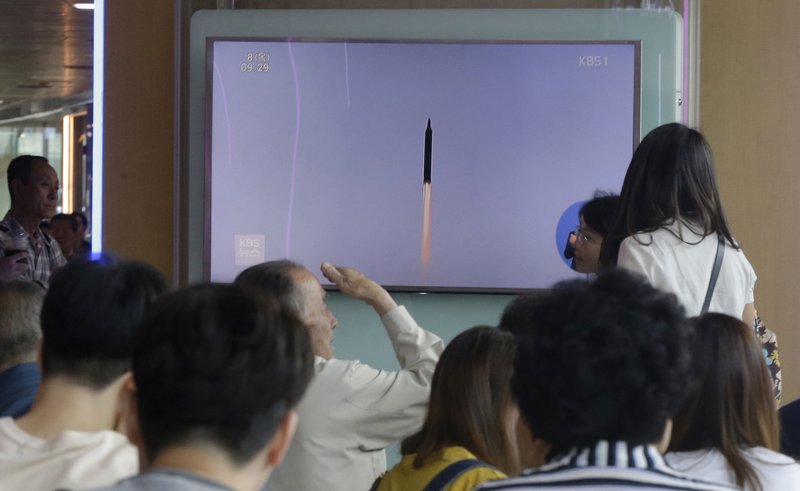UNITED NATIONS -- North Korea's latest launches of several suspected anti-ship missiles were short-range and landed well short of past efforts, but they still served as a defiant message for its enemies that Pyongyang will continue to pursue a weapons program that has rattled its neighbors and Washington.
The projectiles were fired Thursday from the North Korean eastern coastal town of Wonsan and likely flew 125 miles, South Korea's Joint Chiefs of Staff said. They landed in waters between the Korean Peninsula and Japan, where U.S. aircraft carriers USS Carl Vinson and USS Ronald Reagan participated in joint exercises with the South Korean navy that ended earlier this week.
South Korean President Moon Jae-in, a liberal who has expressed a desire to reach out to the North, said during a National Security Council meeting he "won't back off even a single step and make any compromise" on the issue of national security. He warned that North Korea could face further international isolation and more economic difficulties.
The North's missile tests present a difficult challenge to Moon. North Korea, which could have a working nuclear-tipped intercontinental ballistic missile in the next several years, also may be the most urgent foreign-policy concern for President Donald Trump's administration, which has been distracted by domestic political turmoil and has insisted China do more to rein in the North's weapons activities.
South Korean military spokesman Roh Jae-cheon said the launch was intended to show off Pyongyang's widening array of missiles and also its "precision strike capabilities" on ships in response to the joint drills.
Bolivia's U.N. Ambassador Sacha Llorentty Soliz, the current U.N. Security Council president, told reporters Thursday that he had not received any requests for a meeting on the latest launches.
The United Kingdom's U.N. ambassador, Matthew Rycroft, condemned North Korea's "latest provocations" and said "we look forward to working with our council colleagues about the best way to respond to them."
"It's irresponsible and it is destabilizing what is already a very sensitive situation," he said.
He said the U.K. was looking at details of the launches and it's possible "that they come underneath a threshold to count as a violation."
The Security Council voted unanimously on June 2 to add 15 individuals and four entities linked to North Korea's nuclear and missile programs to a U.N. sanctions blacklist. That was in response to a spate of recent ballistic missile tests which violate U.N. sanctions.
North Korea's weapons tests are meant to build a nuclear and missile program that can stand up to what it sees as U.S. and South Korean hostility, but they are also considered by outside analysts as ways to make North Korea's political demands clear to leaders in Washington and Seoul. Analysts say the latest test appeared to be aimed at keeping up pressures on Moon to wrest concessions.
Moon has sought to expand cross-border civilian exchanges as a way to improve ties, but North Korea on Monday rejected a Seoul civic group's offer to provide anti-malaria supplies to protest South Korea's support of fresh U.N. sanctions adopted last week.
In what will likely become another source of animosities, Moon's government said Thursday that it will let two of the four North Korean fishermen recently rescued at sea resettle in the South in accordance with their wishes. The two other fishermen who want to return home will be repatriated.
North Korea is expected to demand the return of all four fishermen by accusing South Korea of enticing them to defect to the South.
The launches Thursday were North Korea's fourth missile test since Moon's inauguration on May 10.
Last month, North Korea premiered a powerful new midrange missile that outside experts said flew higher than any other missile previously tested by North Korea.
The North in following weeks launched a solid-fuel midrange missile that can be fired on shorter notice than liquid fuel missiles, and also what it described as a new "precision-guided" missile, which experts say is designed with a maneuverable terminal stage meant to frustrate missile-defense systems like the U.S.' Terminal High Altitude Area Defense network that is being deployed in South Korea.
Information for this article was contributed by Edith M. Lederer of The Associated Press.
A Section on 06/09/2017


